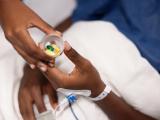August 17, 2009
Oseltamivir resistance seen in two immunosuppressed H1N1 patients
Oseltamivir (Tamiflu) resistance developed in two immunosuppressed patients in Seattle who were treated with the drug for novel H1N1 flu, the CDC reported recently. Both patients, a teenage boy and a woman in her 40s, were receiving immunosuppressive therapy for leukemia, and both had prolonged viral shedding. The cases were not epidemiologically linked. The CDC said clinicians caring for such patients should be aware of the potential for antiviral resistance and prolonged viral shedding.
http://www.cdc.gov/mmwr/preview/mmwrhtml/mm58d0814a1.htm?s_cid=mm58d0814a1_e
Aug 14 MMWR Dispatch
UK expert panel urged against prescribing Tamiflu by phone
In launching its system to diagnose H1N1 flu and prescribe oseltamivir by phone, the British government rejected an advisory committee's advice that the practice might engender growing resistance to the drug, according to the Guardian newspaper. A member of the committee said officials judged that the public would not tolerate being told that the national stockpile could not be used, the story said. The advisory panel said the drug should be reserved for people in high-risk groups.
http://www.guardian.co.uk/world/2009/aug/16/swine-flu-tamiflu-helpline-paracetamol|
Aug 16 Guardian report
British health officials ask neurologists to track GBS cases
England's Health Protection Agency has sent a letter to neurologists asking them to be alert for any increase in Guillain-Barre syndrome (GBS) cases after the public starts receiving the novel H1N1 vaccine, the London Daily Mail reported on Aug 15. The letter, obtained by the newspaper, warns of GBS cases that occurred in the wake of the 1976 US swine flu vaccine campaign. Britain's neurologist association told its members in July that it would launch a 9-month GBS survey on Aug 1.
http://www.dailymail.co.uk/news/article-1206807/Swine-flu-jab-link-killer-nerve-disease-Leaked-letter-reveals-concern-neurologists-25-deaths-America.html
Aug 15 Daily Mail story
Quebec districts to keep pregnant teachers home this fall
Two school districts in Quebec will keep pregnant teachers at home this fall to reduce their risk of severe complications if they get sick with pandemic H1N1 flu, the Toronto Star reported on Aug 15. An official from the Toronto district school board said keeping pregnant teachers home is an idea worthy of consideration, but quantifying the risks is difficult. Pregnant women are listed as a priority group for novel flu vaccines by the United States and the United Kingdom.
http://www.thestar.com/news/canada/article/681658
Aug 15 Canadian Press story
China rolls out tough school flu-prevention measures
China's state media said yesterday that the country's education and health ministries have ordered strong measures to curb the spread of the novel flu virus when schools reopen, AFP reported yesterday. Schools in flu-stricken areas can postpone the start of the school year and have been advised not to hold large gatherings and to reduce class sizes. Students are being asked to stay home for 7 days if they have close contact with a sick person and, if they are sick, to stay home until recovered.
http://www.khaleejtimes.com/DisplayArticle08.asp?xfile=data/international/2009/August/international_August1104.xml§ion=international
Aug 16 AFP story
Democratic Republic of Congo reports first pandemic flu case
The Democratic Republic of Congo reported its first novel flu case, in a South African mining official employed by a US firm in Katanga province, Agence France-Presse (AFP) reported today. The man, who is recovering, had recently returned from a vacation in South Africa, and so far none of his family contacts have had flu-like symptoms.
Egyptian pilgrims protest travel ban
About 300 people staged a protest at Cairo's airport yesterday to oppose an Egyptian government restriction that bars them from traveling to Mecca on pilgrimage, the Associated Press reported. Airport security dispersed the crowd. The travel ban is intended to slow the spread of the pandemic H1N1 virus. The new restriction took effect yesterday. Only travelers between ages 25 and 65, a group thought to be at lower risk for flu, are allowed to make the trip to Mecca.
http://www.pennlive.com/newsflash/index.ssf?/base/international-11/1250419027177100.xml&storylist=health
Aug 16 AP story





















